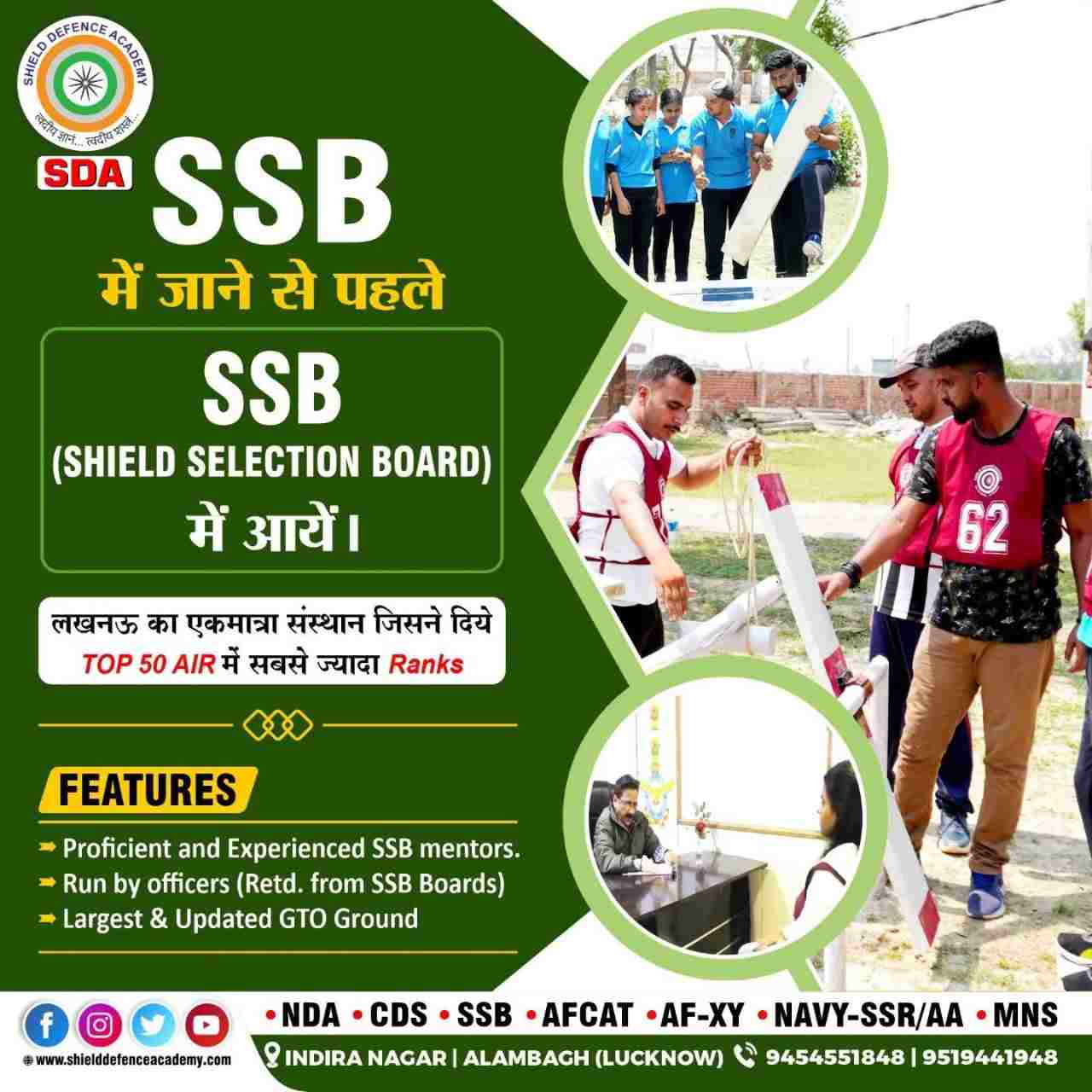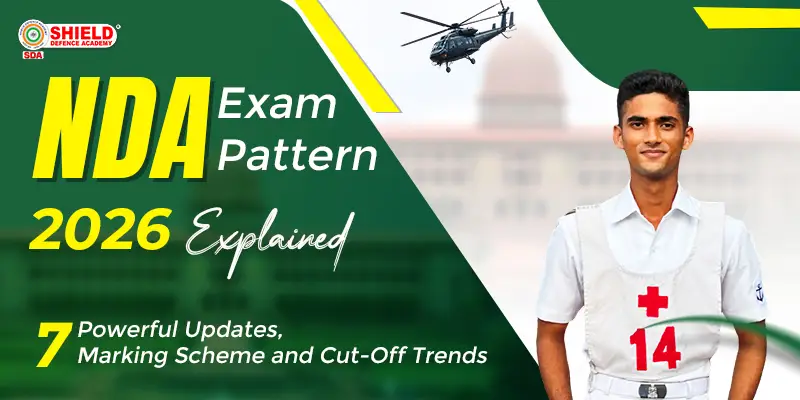If you really want to know key tips for easily cracking NDA then focus on The History and Polity section of the NDA (National Defence Academy) Exam, It is a crucial part of the assessment as it is theory based section, and mastering this subject can significantly boost your overall score. While some may find English challenging, with the right approach and adequate preparation, scoring high in this section is entirely possible. In this blog, we’ll discuss effective strategies to prepare for the History and Polity section of the NDA Exam 2024.
Shield Defence Academy is your ultimate destination for mastering History and Polity subjects for easily cracking NDA. With a team of Experienced Educators, we offer rigorous classes designed to empower aspirants with the knowledge and skills required to excel in the NDA Exam 2024.
At Shield Defence Academy, we take pride in our commitment to academic excellence and the holistic development of our students. Our rigorous program of History and Polity is meticulously crafted to cater to the unique requirements of NDA aspirants, ensuring that they are well-equipped to tackle the History and Polity section with confidence and proficiency for easily cracking NDA.
History and Polity syllabus for the NDA exam, along with two examples for each topic:
The syllabus for the History and Polity section for easily cracking NDA exam is crucial for aspirants preparing for the NDA-II 2021. Here is a detailed overview of the syllabus along with examples for each topic:
(I) Ancient Indian History:
a. Indus Valley Civilization: The rise and fall, urban planning, trade, and religious practices.
b. Mauryan Empire: The reign of Chandragupta Maurya, Ashoka’s dhamma, and administration.
Example:
i) Discuss the significance of the town planning of the Harappan civilization.
ii) Explain the impact of Ashoka’s Dhamma on ancient Indian society.
(II) Medieval Indian History:
a. Delhi Sultanate: The establishment, expansion, and cultural developments under various dynasties.
b. Mughal Empire: The reign of Akbar, Aurangzeb, art, architecture, and policies.
Example:
i) Analyze the factors contributing to the success of the Delhi Sultanate.
ii) Assess the impact of Akbar’s religious policies on the Mughal Empire.
(III) Modern Indian History:
a. British Rule in India: Socio-economic, political, and cultural impact, British policies and responses.
b. Indian Freedom Struggle: Key events, leaders, movements, and ideological differences.
Example:
i) Discuss the impact of British economic policies on Indian agriculture during the colonial period.
ii) Evaluate the significance of the Non-Cooperation Movement in the Indian freedom struggle.
(IV) World History:
a. French Revolution: Causes, events, consequences, and global impact.
b. World War I and II: Causes, key battles, impact on global order, and decolonization.
Example:
i) Compare the causes and consequences of the French and Russian Revolutions.
ii) Analyze the impact of World War I on the political landscape of Europe.
The Polity syllabus for the NDA exam can be divided into the following sections:
(i) Indian Constitution and Polity
(ii) Governance in India
(iii) Political System in India
(iv) Public Policy and Rights Issues.
Further details on the syllabus for the Polity section of the NDA exam are:
(I) Indian Constitution and Polity:
a. Preamble, fundamental rights, directive principles of state policy, fundamental duties, and amendment procedures.
b. Union and its Territory, citizenship, and fundamental rights.
Example:
i) Discuss the significance of the Preamble in the Indian Constitution.
ii) Analyze the role of fundamental duties in promoting civic sense and social harmony.
(II) Governance in India:
a. Executive, legislature, and judiciary: Structure, functioning, and inter-relationship.
b. Elections, political parties, civil services, and accountability mechanisms.
Example:
i) Evaluate the role of the judiciary in upholding the Constitution and protecting fundamental rights.
ii) Analyze the impact of electoral reforms on improving the democratic process in India.
(III) Political System in India:
a. Federalism, center-state relations, and inter-state disputes.
b. Local governance, Panchayati Raj, and urban local bodies.
Example:
i) Assess the challenges and opportunities in center-state relations in a diverse country like India.
ii) Discuss the significance of grassroots democracy in the functioning of local governance institutions.
(IV) Public Policy and Rights Issues:
a. Social justice, human rights issues, and policies for vulnerable sections.
b. Welfare schemes, transparency, and accountability measures in governance.
Example:
i) Evaluate the effectiveness of social justice policies in addressing the challenges faced by marginalized communities in India.
ii) Discuss the role of transparency and accountability in ensuring effective implementation of public welfare schemes.
Preparing for the NDA exam with a thorough understanding of the History and Polity syllabus along with relevant examples will enhance the aspirants’ chances of success. It is essential for candidates to delve deep into each topic, understand the historical context, and critically analyze the polity-related aspects to excel in the examination.
Shield Defence Academy’s Experienced Faculty, who served in this field for a very long time and has given many All India Rank, leverage their first-hand experience and understanding of the NDA examination process to provide invaluable insights and personalized coaching to each candidate. They are dedicated to fostering an environment of mentorship and support, nurturing the leadership qualities and problem-solving abilities of our students.
At Shield Defence Academy, we understand the significance on the History and Polity and its pivotal role in the NDA examination. Our team of Experienced Faculty brings a wealth of experience, knowledge, and expertise to the training program, ensuring that candidates receive top-tier mentorship and guidance. With a deep understanding of the intricacies of the NDA Exam of History and Polity section, our instructors are committed to honing the leadership potential of every candidate who walks through our doors.
Tips to crack this section with the blink of eye:
Crucial Events of Indian Independence: A Chronological Journey
The Indian Freedom Movement is a profound and inspiring saga, marked by pivotal events that shaped the destiny of a nation. To comprehend this historical narrative effectively, one must meticulously follow a chronological order to avoid confusion and ensure a comprehensive grasp of the sequence of events. In this blog, we will embark on a chronological journey through the significant milestones of the Indian Independence movement, from the Battle of Plassey to the Partition of India and Pakistan.
1757 – Battle of Plassey: The Battle of Plassey marked a turning point in Indian history, as the British East India Company secured its dominance over the Indian subcontinent after defeating Siraj-ud-Daulah, the Nawab of Bengal.
1761 – Battle of Panipat: This battle witnessed the Maratha Empire’s defeat at the hands of Ahmad Shah Durrani, altering the political landscape of India.
1764 – Battle of Buxar: The decisive victory of the British East India Company over the combined forces of the Mughal Emperor Shah Alam II and the Nawabs of Bengal and Awadh consolidated British control over Bengal.
1767-69 – First Anglo-Mysore War: The conflict between the British East India Company and the Kingdom of Mysore, ruled by Tipu Sultan, set the stage for subsequent confrontations.
1780-84 – Second Anglo-Mysore War: Another conflict between the British East India Company and Mysore further escalated tensions and territorial disputes.
1784 – Pitt’s India Act: This act reformed the British East India Company’s administration in India, reshaping the governance and oversight of British territories on the subcontinent.
1790-92 – Third Anglo-Mysore War: The culmination of the conflict resulted in the defeat of Tipu Sultan and the imposition of the Treaty of Seringapatam, significantly impacting the balance of power in South India.
1799 – Fourth Anglo-Mysore War: The final confrontation between the British East India Company and Mysore led to the death of Tipu Sultan and the annexation of his kingdom’s territories.
1802 – Treaty of Bassein: This treaty between the British East India Company and the Peshwa established British influence over the Maratha Empire.
1809 – Treaty of Amritsar: The treaty between the East India Company and Maharaja Ranjit Singh delineated the boundaries between the Sikh Empire and British territories.
1829 – Prohibition of Sati: The enactment of laws prohibiting the practice of Sati marked a significant social reform under Lord William Bentinck’s administration.
1839-42 – First Anglo-Afghan War: The British attempt to extend influence into Afghanistan resulted in a costly and ultimately unsuccessful military campaign.
1845-46 – First Anglo-Sikh War: The conflict between the British East India Company and the Sikh Empire led to the annexation of significant Sikh territories.
1852 – Second Anglo-Burmese War: The British expansion further into Southeast Asia resulted in the annexation of Lower Burma.
1857 – First War of Independence: Also known as the Indian Mutiny, this marked a pivotal moment in Indian history, symbolizing a widespread uprising against British rule and the East India Company’s administration.
1861 – Birth of Rabindranath Tagore: Rabindranath Tagore, a poet, writer, and musician, was born in Calcutta, marking the beginning of an era of literary and artistic brilliance in India. His works would go on to inspire generations and fuel the flames of liberation.
1869 – Birth of Mahatma Gandhi: Mohandas Karamchand Gandhi, later known as Mahatma Gandhi, was born in Porbandar, Gujarat. Gandhi’s philosophy of nonviolent resistance and civil disobedience would become defining principles in India’s struggle for independence.
1885 – Foundation of Indian National Congress (INC): The Indian National Congress, founded with the aim of obtaining a greater share in government for educated Indians, played a crucial role in the country’s fight for freedom. It later evolved into a major force in the independence movement.
1897 – Birth of Subhash Chandra Bose: Subhash Chandra Bose, a charismatic and influential leader, was born in Cuttack. His unwavering commitment to India’s independence led to his pivotal role in the freedom movement and the formation of the Indian National Army (INA).
1889 – Birth of Jawaharlal Nehru: Jawaharlal Nehru, the first Prime Minister of independent India, was born in Allahabad. His long-lasting impact on India’s political landscape and his role in the struggle for independence cannot be overstated.
1903 – Tibet Expedition: The British India military expedition into Tibet marked a turning point in India’s relationship with the British government, shaping the dynamics of power and influence in the region.
1905 – Partition of Bengal: The controversial partition of Bengal by the British ignited widespread protests and nationalist fervor, laying the groundwork for a unified resistance against colonial rule.
1906 – Foundation of Muslim League: The formation of the Muslim League marked a significant step in the articulation of Muslim political interests in British India and set the stage for the subsequent Partition of India.
1911 – Delhi becomes capital of India: The declaration of Delhi as the new capital of India symbolized a symbolic shift in power and administration, reaffirming the country’s historical significance.
1914 – World War I begun: The outbreak of World War I significantly altered the global political landscape and created opportunities for India to assert its demands for self-governance.
1916 – Lucknow Pact signed: The Lucknow Pact, a crucial milestone in Hindu-Muslim unity, paved the way for joint political action and marked a pivotal moment in India’s quest for freedom.
1918 – World War I ends: The conclusion of World War I set the stage for intensified nationalist movements and demands for self-rule in India.
1919 – Montague-Chelmsford Reforms introduced; Jallianwala Bagh Massacre:
The Montague-Chelmsford Reforms and the Jallianwala Bagh Massacre served as stark reminders of the need for more meaningful and substantial reforms in India’s governance.
1920 – Khilafat Movement: The Khilafat Movement, a pan-Islamist political protest campaign launched by Indian Muslims, showcased the unity and resilience of India’s freedom fighters.
1927 – Boycott of Simon Commission: The boycott of the Simon Commission highlighted the growing dissent and resistance against British policies, amplifying the call for complete independence.
1928 – Death of Lala Lajpat Rai: The death of Lala Lajpat Rai, an influential leader in the Indian independence movement, sparked outrage and solidified the resolve of the freedom fighters.
1929 – Resolution of Poorna Swaraj: The historic declaration of Poorna Swaraj, or complete independence, at the Lahore session of the Indian National Congress set the stage for an unwavering pursuit of freedom.
1930 – Civil Disobedience Movement; Dandi March: Mahatma Gandhi’s Civil Disobedience Movement and the iconic Dandi March became emblematic symbols of nonviolent resistance and mass mobilization against oppressive colonial laws.
1931 – Gandhi-Irwin Pact: The Gandhi-Irwin Pact marked a significant step towards reconciliation and dialogue between the Indian National Congress and the British government.
1935 – Government of India Act: The Government of India Act of 1935 introduced significant reforms and marked a shift towards provincial autonomy and self-governance.
1937 – Provincial Autonomy: The implementation of provincial autonomy granted a degree of self-rule, empowering Indian leaders to govern their regions independently.
1939 – World War II Begins:
The outbreak of World War II created new challenges and opportunities for India’s independence movement, shifting the global geopolitical landscape.
1941 – Escape of Subhash Chandra Bose; Death of Rabindranath Tagore:
Subhash Chandra Bose’s escape and Rabindranath Tagore’s passing marked significant events that influenced the trajectory of India’s struggle for independence.
1942 – Cripps Mission; Quit India Movement: The Cripps Mission and the Quit India Movement showcased India’s unwavering determination and resolve for complete independence from British rule.
1943-44 – Formation of Provisional Government of Free India and INA; Bengal Famine:
The formation of the Provisional Government of Free India and the Indian National Army, along with the devastating Bengal Famine, highlighted the intense struggle and sacrifices made for independence.
1945 – Trial of INA; Shimla Conference; World War II ends: The trial of the Indian National Army, the Shimla Conference, and the conclusion of World War II set the stage for the final push towards independence.
1946 – British Cabinet Mission visits India; Interim Government formed: The visit of the British Cabinet Mission and the formation of the Interim Government represented crucial steps towards the transfer of power and the framing of India’s future.
1947 – Indian Independence; India and Pakistan Partition: The historic achievement of independence and the subsequent partition, resulting in the birth of India and Pakistan as sovereign nations, marked the culmination of decades of relentless struggle, sacrifice, and determination.
In conclusion:
The History and Polity of NDA Exam is an instrumental stage in assessing candidates’ communication skills, articulation, and overall demeanor while speaking. By approaching this phase with strategic preparation, a well-structured presentation, and an impactful delivery, candidates can effectively showcase their leadership potential and communication capabilities.
Shield Defence Academy offers Test Series, Mock tests, Free Study Material, Previous year’s question papers for various exams and we offer GTO Ground for the well-being of our aspirants. Our expert guidance is provided by Experienced Faculty and Retired Armed Forces Officers from The SSB Interview Board. Prepare for success with our comprehensive resources and the insights of experienced professionals. Join Shield Defence Academy for the ultimate preparation experience. Good luck with your preparation!










